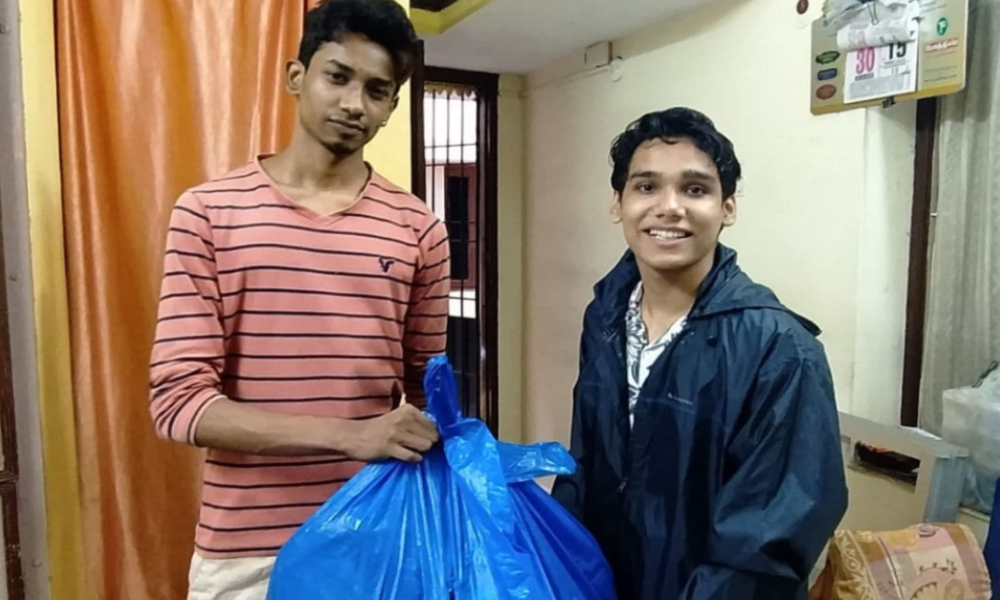
Image Credits: UBS Team
Go Clean, Go Green: Student Initiative Transforms Plastic Waste Into Hydroponic Plant Holders
Maharashtra, 20 July 2021 8:52 AM GMT | Updated 21 July 2021 7:49 AM GMT
Editor : Ankita Singh |
A literature lover who likes delving deeper into a wide range of societal issues and expresses her opinions about the same. Keeps looking for best-read recommendations while enjoying her coffee and tea.
Creatives : Prattusa Mallik
A student of Journalism and Audio-Visual Communication, interested in words and silences alike, I aim to bring the narratives of the periphery to the centre, one story at a time. When not working, I'm usually caught reading, thinking, writing, watching Friends, or stargazing.
The aim of this project is to reduce plastic waste and minimise the use of soil in agriculture. It involves gathering used plastic bottles and reusing them to cultivate plants through hydroponics.
A 2019 report by Central Pollution Control Board (CPCB) estimated that India generates nearly 4,059-tonne plastic waste every day. Another study suggested that globally, a million plastic bottles are purchased every minute, and the number will jump another 20% by 2021, creating an environmental crisis. While organisations worldwide are investing in research about the possible ways to address the issue, a team of young students have come up with a creative solution to this problem.
Ten management students from Universal Business School (UBS) in Mumbai initiated Project Roop — a project to upcycle plastic bottles and use them in hydroponic farming. The aim of this project is to reduce plastic waste and minimise the use of soil in agriculture. Precisely, it involves gathering used plastic bottles and reusing them to cultivate plants through hydroponics. For those not acquainted with this, hydroponics is a method of horticulture in which plants grow in nutrient-rich water instead of soil.
Sudharma Kambhamettu, student president of ENACTUS-UBS, said, "Being a part of the green management institute, we were inspired to work in this area and create a sustainable model that will promote ecosystem restoration."
Enactus is a social enterprise having units in several educational institutes across the globe, intending to develop the next generation of entrepreneurial leaders and social innovators. The ENACTUS wing in UBS is called ENACTUS-UBS, which these ten students were part of.
But how exactly does the hydroponic plant holder work?
Developing The Product
The students have developed a prototype model of the plant holder. The prototype is built of five half-cut 1-litre bottles (upside-down) connected with a small pipe, through which the nutrient-rich water can be dispersed to all the bottles. Connecting the bottles through pipes forms a chain-like structure, making it possible to water multiple bottles simultaneously.
In a conversation with The Logical Indian, Project Head Het Gor revealed how the idea of this product had originated. "Hydroponic farming is getting quite popular around the world, but it has not yet earned that fame in India. I had it at my home and saw that we could produce some herbs at home with PVC pipes very easily. This led to the idea of introducing a hydroponic prototype where we used plastic bottles instead of PVC pipes," he said.
To raise funds for the project, the team had organised an event for the students called 'Redesign to Reuse'. Each participant had paid a registration fee of ₹ 50. The event winners were given cash prizes, and the remaining amount was put aside for the project's operations.
Conducting Cleanliness Drives
But perhaps the most crucial step was gathering the raw material, that is, used plastic bottles of 1 litre and above. With the philosophy of 'charity begins at home', the team started collecting used bottles from their own homes and housing societies. Cleanliness drives were also carried out at some public places in Mumbai and Chennai. Within a week, they had gathered around 30 kgs of plastic waste.
The project experienced its first setback when the team had to stop the cleanliness drives because of the increasing COVID-19 cases. Due to the pandemic-induced restrictions, the team has not been able to go back to the campus till now.
But the long wait could not deter them towards achieving their ultimate goal. Despite the limitations, the team kept working. Now, they are just a week away from finishing the construction of the prototypes. They have completed the testing stage and are currently working on the implementation. UBS authorities have promised them a space in the campus dedicated to farming. Now, the team is waiting to go back to the campus and start planting.
Plans For Selling
Director-Research and Faculty-in-charge of ENACTUS-UBS Dr Asha Bhatia noted, "This is a completely student-driven project. They have been involved in each and every aspect, be it ideation, development of the prototype or procurement of materials such as plastic bottles, jute and pipe. The finances will also be handled by them."
Yes, the project does not stop at only reducing and reusing resources on the campus. When asked whether these hydroponic plant holders will be up for sale, Kambhamettu revealed yet another dimension of the project. In collaboration with Light of Life Trust, the team will teach manufacturing of the product to rural women in need.
Initially, the team will sell and market the product. However, the revenue and the profit would be for the beneficiaries working on developing the product. The team also has plans to use eco-friendly materials like jute and tags made from cotton to make customised bottles.
Ongoing Promotions
At present, the team is actively promoting the initiative to citizens through social media and through an in-house podcast series called 'Make it Green' where they invite speakers to talk about plastic-induced pollution and discuss sustainable solutions. Once the pandemic situation gets better, they plan to resume the cleanliness drives and promote through them. "The aim is to make the project self-sustainable and reach out to communities within Mumbai and nearby areas over the next couple of months," added Project Member Abhishek K.
Since the holders manufactured at present have been designed for indoor plants, the primary target audience of Project Roop will be households and terrace-farming enthusiasts. "Rooftop gardening or terrace gardening has gained attention over the past few years in cities due to the lack of space, as well as a need for creating greener environments," noted Gor.
Indoor farming enthusiast Sujati Mukherjee was asked whether she would consider using the hydroponic plant holders instead of the clay pots and tin cans she commonly uses to hold her plants. She said, "Yes, I would definitely use it. Because plastic waste generated has been growing day by day. This problem can be efficiently tackled if these bottles are upcycled in creative ways. So yes, I'll definitely use the product."
Moving Forward
For now, the prototypes being built are meant for small home decor plants. Once this is successful, the team plans to enhance the system and plant fruits and vegetables. This phase would require as many as 15-20 kg water bottles but is expected to produce a better yield.
Through this, the team aspires to help the farmers. "Our main aim is to ensure we upcycle plastic as much as we can and minimise the use of soil for farming," noted Kambhamettu.
Also read: Kerala-Based Brand 'Thooshan' Launches Edible Cutlery To Fight Battle Against Single-use Plastic
 All section
All section














